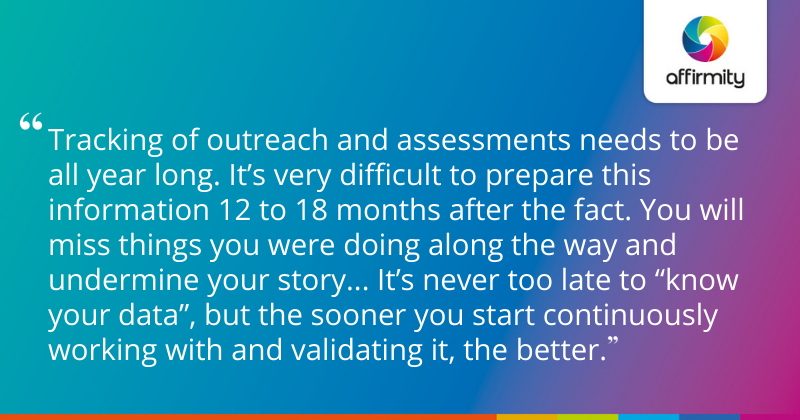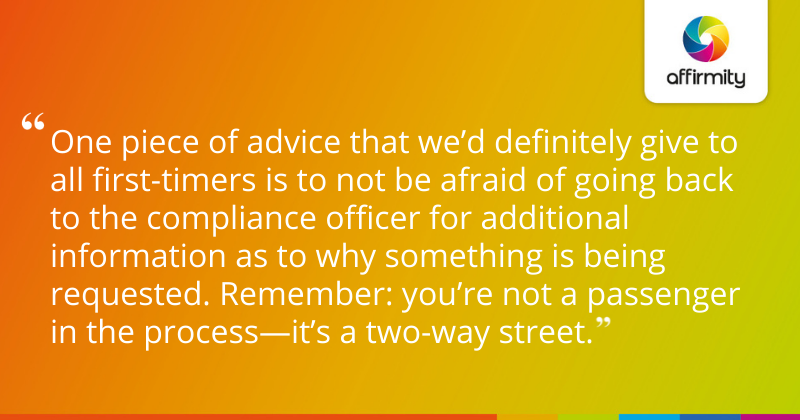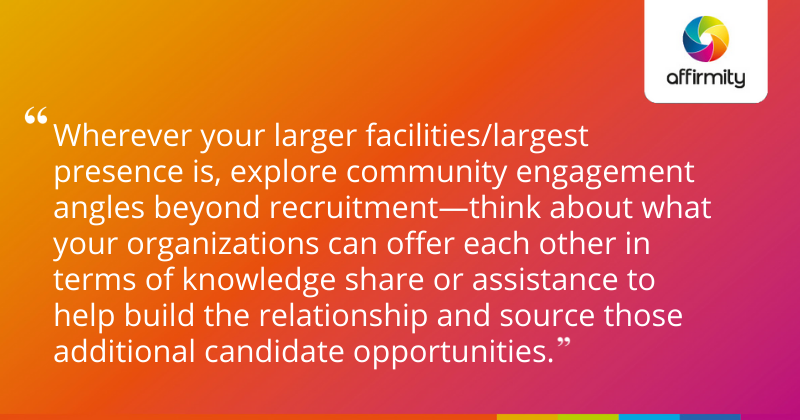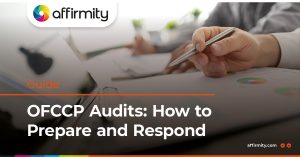Though the process is potentially complex, many organizations like yours have been through the OFCCP auditing process before. Our experts have learned a great deal from assisting our customers and have pulled together seven lessons and five frequently asked questions that will help you prepare and benefit from the process.
Top 7 Lessons Learned From Compliance Reviews

The Affirmity team has collectively assisted with countless OFCCP audits big and small, and there are naturally some recurring challenges that organizations face. These challenges inform the seven lessons:
- Don’t underestimate the amount of preparation time your audits need—it’s not something you can throw together in 15 minutes!
- Tracking of outreach and assessments needs to be conducted all year long. It’s very difficult to prepare this information 12 to 18 months after the fact. You will miss things you were doing along the way and undermine your story.
- It’s never too late to “know your data”, but the sooner you start continuously working with and validating it, the better.
- If in doubt, seek advice before you submit anything to, or answer any question from, your compliance officer.
- Don’t be afraid to ask questions of not only your consultant but also your OFCCP compliance officer. Understanding the question that an officer is really trying to answer will make your communications with them more efficient.
- Don’t be surprised by additional questions from the OFCCP. You’re probably not going to immediately get a closure letter even if you’ve submitted a technically unimpeachable audit. Don’t consider follow-up questions a failure with your submission.
- Request an extension if needed—officers appreciate that accuracy is more important than speed.
MORE ON KEEPING AN EYE ON YOUR AAP | ‘3 Reasons to Monitor Your Affirmative Action Plan (And 3 Ways to Do It Well)’
5 Frequently Asked Questions About OFCCP Audits
In addition to learning valuable lessons from guiding clients through auditing, we’ve heard some great questions that deserve a wider audience. Here are five of the best frequently asked questions:
Q: What is your recommended plan of action for first-time audit participants?

A: Call your consultant immediately and let them know! If you’ve never gone through an audit before, it’s naturally very daunting. They will walk you through one step at a time—it’s part of their contract with you, so definitely take advantage of that.
When working with Affirmity, we recommend starting with our crosswalk document, looking at the schedule, and taking one step at a time.
One piece of advice that we’d definitely give to all first-timers is to not be afraid of going back to the compliance officer for additional information as to why something is being requested. Remember: you’re not a passenger in the process—it’s a two-way street.
Q: When covering items 7, 8, 11, and 12, is it enough to provide the OFCCP with a list of postings for veterans, persons with disabilities, or other groups?
A: While the list is a great starting point, your OFCCP officer will want more information, especially for a Section 503 or VEVRAA focused review. Specifically, they will want to see what happened as a result of the postings—was contact subsequently made with anyone in these groups, were they employed, and so on. In short, the OFCCP is looking for an evaluation of those efforts and not just a listing of the effort.
If you’re struggling to find organizations to use in your search, the OFCCP has examples of recommended agencies relevant to Section 503 and VEVRAA. We’ve seen OFCCP officers referring a number of clients back to that page and asking if they’ve used any of those linked sites. If you lack an organization locally, if you’re at least using the tools that the OFCCP provides, they will likely look on that favorably.
FURTHER READING | ‘4 Key Considerations for Building an Inclusive Work Environment for Individuals With Disabilities’
Q: What additional resources for outreach are there, other than posting with the state or with recruitment services?

A: You may find you have to look outside the box to get the results you need. Seek different contexts to interact with organizations and work with your existing employees. Consider the following tactics:
- Wherever your larger facilities/largest presence is, explore community engagement angles beyond recruitment—think about what your organizations can offer each other in terms of knowledge share or assistance to help build the relationship and source those additional candidate opportunities.
- You may have some team members who are members of other organizations you may not be aware of, so don’t shy away from engaging your management team to find this out.
- Similarly, your leadership may be on the boards or committees of organizations that work with a target group, providing another way of tapping into those resources.
- It is, of course, important that you train your managers on selection to ensure underprivileged groups aren’t being filtered out of your process.
- Finally, always track what you’re doing. Even if your efforts don’t achieve your ideal results, it’s important that you record when you try a different approach after observing how things didn’t work.
Q: Do Corporate Management Compliance Evaluation (CMCEs) apply to non-profit organizations?
A: Though these ‘glass ceiling audits’ have typically been with corporations in the past, there’s definitely an avenue for them to be applied to non-profit organizations.
Q: Are consultant resources only available in the case of an audit, or can we expect mock audit as part of our services too?
A: Consultants should offer mock audit services to help aid an organization’s preparedness. Affirmity has undertaken different types of mock audits with several clients in the past, writing up a full review, and subsequently discussing the results to identify areas of risk in the event of a real audit. Contact your consultant or account manager for more information.
MORE QUESTIONS ANSWERED BY EXPERTS | ‘Advanced Diversity & Inclusion Planning: Experts Address 11 Key Issues’
OFCCP Audits: How to Prepare and Respond: Continue Reading
These lessons and FAQs appear alongside more great insights about the OFCCP auditing process from our team of experts in our guide ‘OFCCP Audits: How to Prepare and Respond’. Download the full guide to learn about:
- The six different types of audit/focused review, and what you can expect from each
- What you should be doing all year-round to prepare for future audits
- What to do when you’re notified of an audit, and everything you should pull together before your final submission
- Practical and useful tools and template documents that will help you manage the process

Download the full guide today.
Are you preparing for future OFCCP audits? Contact us to learn more about our consulting services and software solutions.
